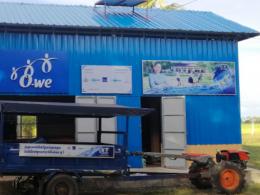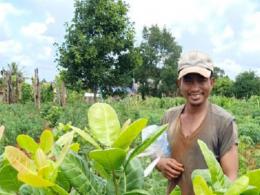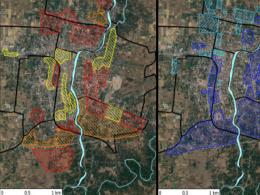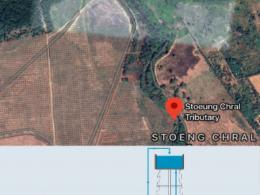Promoting resilience in agricultural production and enterprises for food security among subsistence farmers along the Mekong
Background
Rational / Relevance: Sustainable climate change adaptation for small-scale farmers is dependent on reducing vulnerability by moving from low return, subsistence agricultural, to higher-return agricultural activities. Link with objectives in CCCSP:
1. Promote climate resilience through improving food, water and energy
5. Improve capacities, knowledge and awareness for climate change responses
6. Promote adaptive social protection and participatory approaches in reducing loss and damage due to climate change
7. Strengthen institutions and coordination frameworks for national climate change responses.
Overall Objective
Increased sustainable food security among rural poor communities along the Mekong River, in the Prey Lang Landscape, by developing the climate resilient food production systems
Expected Results
- Increased production of agricultural products with cyclical climate adapted techniques
- Strengthened income generation and access market
- Integration and support for CCA farming techniques and ACU by local authority
Location
Sambour district, Kratie province
Approach
The established method for improving agriculture amongst smallholder farmers is through the formation of farmer groups. After orientation workshops, the project therefore will strengthen and extend membership of 4 established CBOs in the 2 target villages. The CBO will be essential for agricultural technique sharing and providing access to finance for farming inputs whilst also increasing reliance to shocks. The 3 selected farmers from each village will practice the new farming techniques on a Model Farm that has access to solar-power water system for irrigation.
CRDT and CBO members will conduct a market study to identify business potential and identify a network with development partners, buyers. This will identify potential and high value produce that can be linked to markets. Improving the coordination of agricultural production, marketing and sales within the value chain can reduce transaction costs, help guarantee product quality and safety, and enhance design of marketing strategies. CRDT will therefore support the creation of 1 (one) Agricultural Cooperative Union (ACU) formed, strengthened, provided access to a finance institution and linked to producers and traders in markets. The projects will, however, be complementary; the CBET sites and active tourism in the area will provide a market to link into. The Model Farms will also be used as an attraction for visitors to understand how new agricultural methods are being used to adapt to the changing climate.
CRDT will also build institutional capacity for Improved Commune Council and village chiefs’ knowledge of climate change and adaptation-farming techniques needs and integrate CCA into CIP.
Achievements to date
- Two solar powered water pumping systems built
- Model Farmers trained and practicing cyclical farming
- Model Farms sustainably operate and serve as learning centers
- Market study conducted to identify potentials and networks
- Agricultural Cooperative Union (ACU) formed
- ACU strengthened, accessed to capital and market
- Communities understand climate change and adaptation needs
- Improved knowledge of Climate Change in Commune Council
- Commune Council support cyclical farming and ACU






